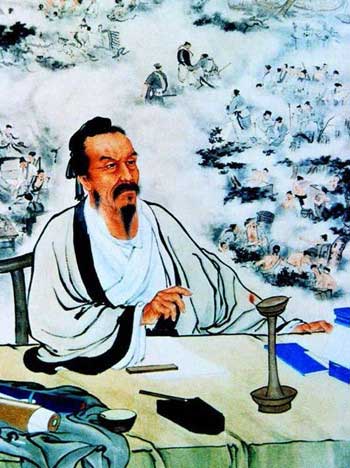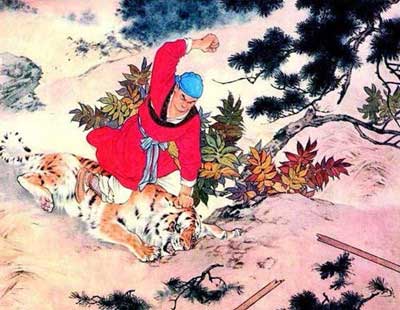- +86-13267351235
- info@globalstourtravels.com
Shi Naian (c. 1 296- 1 3 7 1 ), a contemporary of the author of Romance of the Three Kingdoms, created the long novel Water Margin, which depicts heroes, knights-errant, wicked people and robbers, includes funny parts and sad parts and encompasses all feelings in the world. It was handed down from the late Ming Dynasty to today, and its charm was everlasting.
Water Margin was the first chapter-based novel written in vernacular Chinese in China's history. With the theme of the Song Jiang Uprising in the late Northern Song Dynasty, it historically reproduces the occurrence, development course and tragic end of the uprising. In the Southern Song Dynasty, Liangshan heroes' stories were already widespread, and Gong Kai wrote Eulogy of 36 Heroes Headed by Song Jiang and Preface in that period. From the late Song Dynasty to the early Yuan Dynasty, many storytellers' scripts based on stories of the Water Margin emerged. After interpretation in various dynasties, the number of Liangshan heroes in poetic drama of the Yuan Dynasty finally increased to 108.

Shi Nai’an is Writing Water Margin, painting by Yan Shaoxiang of our era.
Water Margin created by Shi Naian integrates the essence of previous stories of Liangshan heroes, keeps to the theme of "misgovernment driving people to revolt," and depicts a grand historical picture in detail. The spectacular heroic images shaped in Water Margin are most conspicuous. Shi Naian used multiple modes such as portrait description and detail description to vividly depict Liangshan heroes.
The 40th chapter is a dividing point in the book. The first 40 chapters mainly describe how various heroes gather at Liangshan. After the 40lh chapter, the Liangshan Uprising develops to a new stage, and larger-scale combats with the government army and local despotic gentry's armed forces begin, such as the three attacks on Zhu Village, the capture of Zengtou Town, the capture of Gaotang and the attacks on Qingzhou, Huazhou, Darning Prefecture, Dongchang Prefecture, Dongping Prefecture, etc. Under the situation of the government army's consecutive setbacks, the imperial court begins to implement the policy of offering amnesty and enlistment to rebels. The Liangshan Uprising in Water Margin ends in thorough extermination after acceptance of the imperial court's amnesty and enlistment.
Majestic Star "Panther Head" Lin Chong is a complex image and a typical character "driven to revolt" in Water Margin. He is at first an upright and kindhearted martial arts instructor of the 800,000 imperial guards in Dongjing leading a relatively comfortable life and having no inordinate desire. Gao Qiu's son takes his wife by force and victimizes him. Lin Chong endures humiliation repeatedly and realizes he has no choice but to revolt when Gao Qiu, after one failed scheme, devises another one to kill him. So he kills his personal enemy and goes to Liangshan for shelter.
Leader Star "Protector of Justice" Song Jiang is called "Timely Rain" in the underworld. Having serving as an official for years, he is familiar with officialdom. On the one hand, he is generous in aiding needy people and good at leadership, and on the other hand, he is most ideologically loyal to the throne among the Liangshan heroes. Shi Naian vividly depicted this person with a complex personality. Today, the image of Song Jiang is still quite controversial among readers.
Shi Naian depicted characters' personalities vividly sometimes through language, sometimes through specific acts, sometimes through direct description, sometimes through deliberate digression for contrast and sometimes through few words. For example, Shi Naian describes "Pilgrim" Wu Song's countenance as "having two eyes like stars in the winter sky and two eyebrows like paint." Two eyes like stars in the winter sky alone reveal Wu Song's shrewd and valiant personality. Lin Chong, Lu Zhishen and Yang Zhi are all former military officers highly skilled in martial arts, but under Shi Naian's pen, their personalities are quite different. The Liangshan heroes in Water Margin have different charms and highlights, and can hardly be forgotten by readers.
Water Margin has a compound crisscross structure. The whole course of the Liangshan Uprising runs through the whole book, and is mingled with relatively independent characters and stories. Water Margin depicts characters vividly and depicts events more spectacularly. Stories such as Lin Chong's rush to Liangshan in a snowy night, Yang Zhi's sword sale, Wu Song's killing of a tiger and Lu Junyi's journey under escort were talked about with great relish in tens of hundreds of years. Wu Song's killing of a tiger is a famous story in Water Margin. Actually, there are three scenes of tiger-fighting in the book, i.e. Wu Song's killing of a tiger, Li Kui's slaying of tigers and Xie Zhen and Xie Bao's hunting of tigers. These three tiger-fighting scenes are not redundant at all, and these different heroes' personalities are fully demonstrated.

Wu Song's Killing of a Tiger, painted by contemporary Liu Jiyou
Excellent description of details is a great pioneering contribution of Water Margin to the art of Chinese ancient novels. Romance of the Three Kingdoms originated from "a historical book," so it focuses on macroscopic narration; Water Margin originated from "novels" so it excels in depiction, especially depiction of details. The depiction of Lin Chong in Lin Chong Shelters from the Snowstorm in the Mountain Spirit Temple is an example:
Entering, he shut the door and propped against it a big stone which he had noticed lying to one side. He walked further into the temple and saw on a platform an idol of a mountain spirit with golden armor, flanked by a Nether Region judge and a small demon, one on each side. In a corner was a pile of paper. Lin Chong inspected the whole temple but could find neither occupants nor anyone in charge. Lin placed his spear and gourd bottle on the pile of paper and untied his quilt. He removed his broad-brimmed felt hat, shook the snow from his clothes and peeled off his white tunic which was half soaked, then put it together with his hat on the altar table. He covered himself to the waist with the quilt and drank from the gourd bottle from time to time, helping the cold wine down with slices of the beef he had been carrying.
These few sentences depict Lin Chong's behavior after entry into the temple in great detail and depict the environment in the temple in a true and visible manner. The mild and slow tempo and the cold and solitary atmosphere "quietly" foreshadow the ensuing violent conflict.
Water Margin was the first long novel totally written in popular oral language in China's history, marking the maturity of ancient popular novels' linguistic art. In the course of description of people and depiction of concrete objects, the novel uses a lot of folk sayings and slang, making the overall linguistic style vivid, lively, clear and straightforward. Besides, the linguistic styles of characters in Water Margin are distinctive - for example, Song Jiang always talks about loyalty and righteousness, and Li Kui speaks rudely. Linguistic individualization plays an important role in shaping characters' images and pushing forward plot development.